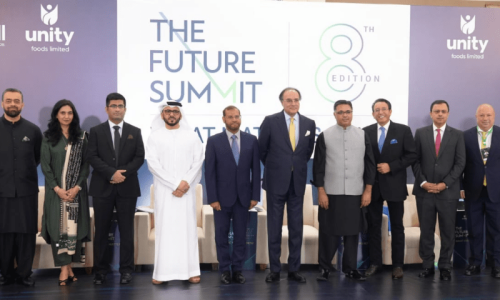• Calls population explosion and climate change impacts ‘existential problems’ for the country
• Says IMF team coming for ‘stock-taking’, claims country is ‘way ahead’ of its target for new filers
ISLAMABAD: Admitting that the salaried class is already overburdened, Finance Minister Muhammad Aurangzeb on Friday said that increasing taxes was not a solution, rather the expansion of the tax net should be the ultimate goal.
Speaking during a session of the Islamabad Literature Festival, which began in the capital on Friday, the finance czar said that countries “do not and cannot run on charity or donations”, maintaining that economy needed taxes to sustain long-term growth.
“As a country our hand has been forced,” he said, adding that if the taxation regime was not extended to real estate and wholesale retailers or the agriculture side, the government would have to keep coming back to the salaried class and industry for more.
He admitted, however, that these segments were already beyond the saturation point. “We cannot afford to tax more the same [classes] who have been taxed at a level which is not sustainable anymore,” he said.
His remarks came during a conversation with Vaqar Ahmed in a session titled ‘Economic Stabilisation and the Journey to Growth’, held at the Citizens Club in F-9 Park.
Existential issues
Referring to a population explosion as an existential issue for Pakistan, he said when the country was facing difficulties with a population of 240 million, imagine what would happen if this number rose to 400 or 450 million.
“This is not a ticking bomb, this has already exploded,” he said, adding: “I count child stunting and learning poverty — especially among girls and young women — among these issues”.
He also mentioned the climate change challenges, referring to the aftermath of the 2022 floods and the current situation of smog in Lahore and the rest of Punjab. “De-carbonisation and air pollution, these are the issues that all of us should be talking about.”
“Whether I remain or not… we may be able to get out of the IMF [cycle] in three years, but if we don’t address these issues, where will be as a country,” he asked.
When asked about the reasons behind a visit from an IMF team next week, he said that as far as he was concerned, the delegation was just coming for “stock-taking”.
However, he expressed confidence that the country was “in a good space in terms of quantitative… and restructuring benchmarks”.
“We are way ahead on the number of new filers in the country,” he said.
“We will now move forward and not look back. We will fix the system soon,” he said, adding that the figures were visible to all.
Mr Aurangzeb also stressed that the time for talking about reforms was over. “State-Owned Enterprises (SOEs) must undergo reform and should be privatised,” he said, adding that the private sector must take the lead in this process, and the dependency on the government must be reduced to allow for more efficient and effective management.
There are many organisations in the public sector which are for profit and there are various ways to privatise them — full privatisation, phased privatisation and outsourcing.
Published in Dawn, November 9th, 2024














































Dear visitor, the comments section is undergoing an overhaul and will return soon.